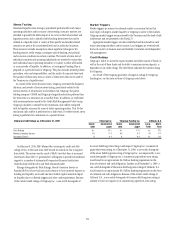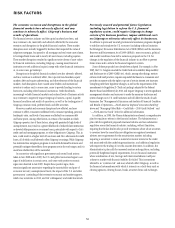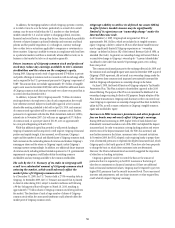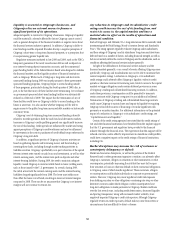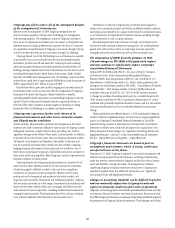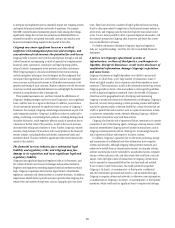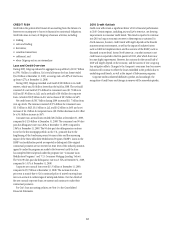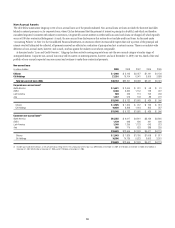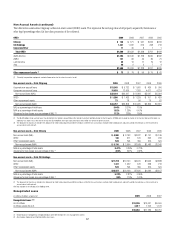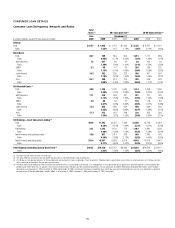Citibank 2009 Annual Report Download - page 70
Download and view the complete annual report
Please find page 70 of the 2009 Citibank annual report below. You can navigate through the pages in the report by either clicking on the pages listed below, or by using the keyword search tool below to find specific information within the annual report.60
to anticipate and implement and can materially impact how Citigroup records
and reports its financial condition and results of operations. For example,
the FASB’s current financial instruments project could, among other things,
significantly change the way loan loss provisions are determined from an
incurred loss model to an expected loss model, and may also result in most
financial instruments being required to be reported at fair value.
Citigroup may incur significant losses as a result of
ineffective risk management processes and strategies, and
concentration of risk increases the potential for such losses.
Citigroup seeks to monitor and control its risk exposure through a risk and
control framework encompassing a variety of separate but complementary
financial, credit, operational, compliance and legal reporting systems,
internal controls, management review processes and other mechanisms.
While Citigroup employs a broad and diversified set of risk monitoring
and risk mitigation techniques, those techniques and the judgments that
accompany their application may not be effective and may not anticipate
every economic and financial outcome in all market environments or the
specifics and timing of such outcomes. Market conditions over the last several
years have involved unprecedented dislocations and highlight the limitations
inherent in using historical data to manage risk.
These market movements can, and have, limited the effectiveness of
Citigroup’s hedging strategies and have caused Citigroup to incur significant
losses, and they may do so again in the future. In addition, concentration
of risk increases the potential for significant losses in certain of Citigroup’s
businesses. For example, Citigroup extends large commitments as part of its
credit origination activities. Citigroup’s inability to reduce its credit risk by
selling, syndicating or securitizing these positions, including during periods
of market dislocation, could negatively affect its results of operations due to
a decrease in the fair value of the positions, as well as the loss of revenues
associated with selling such securities or loans. Further, Citigroup routinely
executes a high volume of transactions with counterparties in the financial
services industry, including brokers and dealers, commercial banks and
investment funds. This has resulted in significant credit concentration with
respect to this industry.
The financial services industry faces substantial legal
liability and regulatory risks, and Citigroup may face
damage to its reputation and incur significant legal and
regulatory liability.
Citigroup faces significant legal and regulatory risks in its businesses, and
the volume of claims and amount of damages and penalties claimed in
litigation and regulatory proceedings against financial institutions remain
high. Citigroup’s experience has been that legal claims by shareholders,
regulators, customers and clients increase in a market downturn. In addition,
employment-related claims typically increase in periods when Citigroup has
reduced the total number of employees, such as during the prior two fiscal
years. There have also been a number of highly publicized cases involving
fraud or other misconduct by employees in the financial services industry in
recent years, and Citigroup runs the risk that employee misconduct could
occur. It is not always possible to deter or prevent employee misconduct, and
the extensive precautions Citigroup takes to prevent and detect this activity
may not be effective in all cases.
For further information relating to Citigroup’s legal and regulatory
risks, see “Legal Proceedings” and Note 30 to the Consolidated Financial
Statements.
A failure in Citigroup’s operational systems or
infrastructure, or those of third parties, could impair its
liquidity, disrupt its businesses, result in the disclosure of
confidential information, damage Citigroup’s reputation
and cause losses.
Citigroup’s businesses are highly dependent on its ability to process and
monitor, on a daily basis, a very large number of transactions, many of
which are highly complex, across numerous and diverse markets in many
currencies. These transactions, as well as the information technology services
Citigroup provides to clients, often must adhere to client-specific guidelines,
as well as legal and regulatory standards. Due to the breadth of Citigroup’s
client base and its geographical reach, developing and maintaining
Citigroup’s operational systems and infrastructure is challenging. Citigroup’s
financial, account, data processing or other operating systems and facilities
may fail to operate properly or become disabled as a result of events that are
wholly or partially beyond its control, such as a spike in transaction volume
or unforeseen catastrophic events, adversely affecting Citigroup’s ability to
process these transactions or provide these services.
Citigroup also faces the risk of operational failure, termination or capacity
constraints of any of the clearing agents, exchanges, clearing houses or other
financial intermediaries Citigroup uses to facilitate its transactions, and as
Citigroup’s interconnectivity with its clients grows, it increasingly faces the
risk of operational failure with respect to its clients’ systems.
In addition, Citigroup’s operations rely on the secure processing, storage
and transmission of confidential and other information in its computer
systems and networks. Although Citigroup takes protective measures and
endeavors to modify them as circumstances warrant, its computer systems,
software and networks may be vulnerable to unauthorized access, computer
viruses or other malicious code, and other events that could have a security
impact. Given the high volume of transactions at Citigroup, certain errors
may be repeated or compounded before they are discovered and rectified.
If one or more of such events occurs, this could potentially jeopardize
Citigroup’s, its clients’, its counterparties’ or third parties’ confidential
and other information processed and stored in, and transmitted through,
Citigroup’s computer systems and networks, or otherwise cause interruptions
or malfunctions in Citigroup’s, its clients’, its counterparties’ or third parties’
operations, which could result in significant losses or reputational damage.



